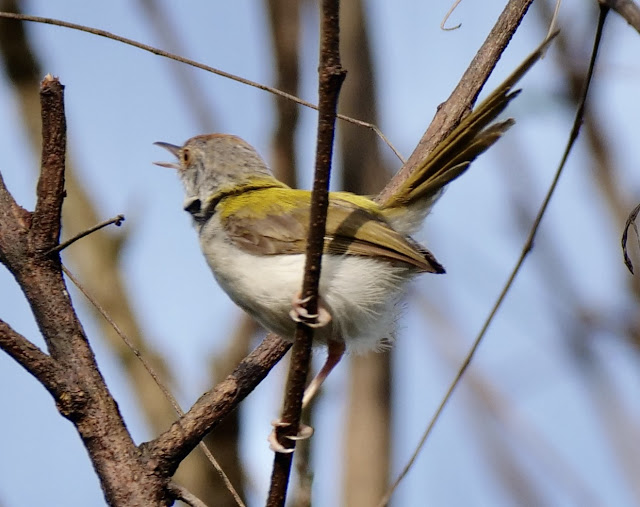 |
I noticed four Sunbirds and a Tailor bird in a bush near the feeding station in our garden today morning. All of them were on their daily morning ritual of grooming their body.
What followed was the chorus of the tuneful singing of the Tailor bird, turning its neck in different directions, while the Sunbirds stayed in the bush. A tailor bird moves the neck and body to produce the bird call, as if it is singing from deep within. The Sunbirds stayed on till the Tailor bird stopped singing and flew away to its next flight station.
I read in Bird books that a tailor bird needs no reason to sing. Its normal habit is singing. Some birders also mentioned to me that if Tailor birds find a garden that is hospitable, they would come regularly to the garden, while on their flight. If they engage in their morning ritual of grooming then, it would suggest that they are resident in the garden or close by.
Th sunbirds and the Tailor birds are small birds. The presence of the Tailor bird in the garden is known by its singing. The bird calls of Sunbirds are subdued. It is by spotting them near flowering plants, while they look for nectar, one gets to know of their presence.
The bird behaviour is often a routine. They develop habits and rituals. A mother who struggled with her three years old daughter in getting her to bathe, put a bird bath in her garden. The Mynas came regularly for the bird bath once or twice a day, at fixed times in the morning and evening. The mother made her daughter watch the bird bath and the ritual of the birds shaking their body, opening their wings and fluttering them to get rid of the water drops. The long ritual of grooming interested the girl. After a few days, having watched the bird bath, the girl gradually decreased her protest for a bath. Her play time in the water eased her stressful behaviour.
It was the first time I heard a fascinating story of a mother priming her daughter to overcome the stress of bathing, by making her watch bird bath and grooming in their garden.
Another mother once told me how she recorded the bird calls of different birds coming to her garden in the phone, to make her pre-school children hear them. That interested both her children to look for birds and listen to their bird calls. Not only they got introduced to musical notes from listening to bird calls, but also became interested to watch birds and learn about their habitat and rituals.
I realise from these anecdotes, that birds are also educators to children!
The cacophony in our garden in the morning produced by bird calls is conditioned by our social responses. On those days when Anna and I are not in the garden, the bird calls are infrequent. If they notice our presence, they are active with flight between trees and chorus of bird calls. I know that Mynas and Bulbuls like to socialise.
Some birds develop friendly orientation and relate to humans well. A birder whom I know well, sits in his garden in the morning and whistles. The birds come to perch in the trees listening to the whistling. He told me that some birds imitate his whistling and would modulate it to correspond with the variations he makes.
Birds bring charm to a garden! They make us more observant and patient!
When I returned after ten days of travel, it took a few days for the regular bird visitors to return to socialise in the morning!
M.C.Mathew(text and photo)







No comments:
Post a Comment